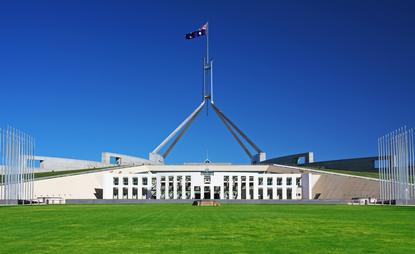Parliament mulls fate of unsold Digital Dividend spectrum
- 20 June, 2013 15:45

A skirmish has broken out between Australian police and the mobile industry over who should have mobile spectrum in the 700MHz band that went unsold in the recent Digital Dividend auction.
The 700MHz spectrum in question is considered valuable because it can be used for 4G mobile coverage in regional areas.
The Police Federation of Australia is actively campaigning Parliament to give public safety agencies 20MHz of the 30MHz that went unsold to commercial mobile operators in the recent Digital Dividend auction. However, the Australian Mobile Telecommunications Association (AMTA), representing those mobile operators, has opposed the Police Federation’s request.
AMTA instead supports a plan for public safety announced in October last year by the Australian Communications and Media Authority (ACMA) under which the public safety agencies would receive 10MHz of spectrum in the 800MHz band. But the Police Federation has argued it needs at least 20MHz to provide enough capacity in the event of a terrorism incident in a major CBD or a major natural disaster.
The debate for 700MHz spectrum is occurring in the context of an ongoing inquiry of the Parliamentary Joint Committee on Law Enforcement. The committee had a hearing on Monday this week and has another scheduled 24 June. The committee is expected to table a report before Parliament rises for the September federal elections.
Police Federation CEO Mark Burgess told Computerworld Australia that his group hopes Parliament will support its position in the report and communications minister Senator Stephen Conroy will follow by directing ACMA to give public safety agencies the 700MHz spectrum.
Conroy had stated before that he would direct the ACMA to return the spectrum to market in two to three years.
AMTA president Chris Althaus said he hopes Conroy won’t change his mind.
“We absolutely reject the ... opportunistic agenda that’s being run at the minute” by the Police Federation, Althaus said in an interview. “It defies a fair bit of logic and we are disappointed really that this approach is being taken when such a lot of work—rigorous, independent, well-managed analysis has been undertaken up until this point.”
“The public safety agencies themselves have been working with the ACMA, with the government, for a couple of years now to get a strong sense of how they can operate in 800MHz,” Althaus said. “The fact there’s still 700MHz post-Digital Dividend has seen them have another go, but we would strongly disagree with that.”
The 700MHz band has been identified for mobile telecom across the globe, Althaus said. “Just because this spectrum didn’t sell at auction does not mean there is a lessening of demand with the sort of volume growth that is forecast in mobile data traffic."
In a written submission, the Police Federation said its members need the spectrum to do their jobs. "Law enforcement, and the other first responders, unquestionably need 21st Century communications tools to do their challenging work, protecting life and ensuring public order in critical situations, safely and effectively," the Police Federation wrote. "This means they need adequate, dedicated mobile broadband spectrum."
“Nobody is suggesting and no one has ever suggested that the public safety agencies shouldn’t have access and be using the latest generation mobile data applications and services,” Althaus said. “But as a nation we need to do these things efficiently and effectively.”
Rush before election
The Police Federation believes that upcoming election in September “provide an opportunity but it could complicate it with so many other issues around”, Burgess said.
“We’ll be using every opportunity between now and the 14th of September to prosecute our case and hopefully get a commitment out of both sides, so whoever wins at the end of the day has a public policy position that would allocate 20MHz of spectrum to public safety.”
In the hearing on Monday, the Police Federation, Australian Federal Police and New South Wales Police all urged Parliament to give 20MHz of the unsold 700MHz spectrum to public safety agencies, said Burgess.
On Wednesday morning, the Police Federation presented its case to Opposition leader Tony Abbott, and in the afternoon the group lobbied the Greens, Burgess said. The Police Federation's next plans to meet with Prime Minister Julia Gillard, either at the end of this week or early next, he said.
AMTA also continues to have discussions with the various parties, said Althaus.
Officials expected to speak at the 24 June hearing are from the ACMA, AMTA, Motorola, Attorney Generals and the Department of Broadband, Communications and the Digital Economy (DBCDE).
In a statement, a Conroy spokesman said the ACMA is responsible for management of spectrum. “Based on information provided by public safety agencies themselves, in October 2012 the ACMA determined that 10 megahertz – that is, 2 x 5 megahertz – is the quantum of 800 MHz spectrum it will reserve for allocation to public safety agencies.
“However, at the request of the [Council of Australian Governments (COAG)] Standing Council on Policy and Emergency Management, it was agreed to allow States and Territories to make further submissions on the allocation of spectrum required," said the spokesman. “The ACMA is currently considering this information and will report in due course.”
Follow Adam Bender on Twitter: @WatchAdam
Follow Computerworld Australia on Twitter: @ComputerworldAU, or take part in the Computerworld conversation on LinkedIn: Computerworld Australia
